In the above picture, you see the three tablespoons of clover seeds it takes to fill a quart jar with sprouts
Important Update!: After happily posting about my newly discovered clover sprouts, I had the sudden thought “What if red clover sprouts also contain canavanine, like alfalfa”. I had never heard a word against clover, so I had assumed it didn’t, but I thought I should at least double check. I decided to research it a little more.
It doesn’t look promising! This study says that while broccoli and radish seeds do not contain canavanine, alfalfa and clover seeds do. This article talks about how clover seeds are actually used to prevent food poisoning when grown with radish or broccoli sprouts and when cooked with rice. This would be good, except after a quick glance through it, it seems that this may be connected to the canavanine content. To learn more about why canavanine is so bad, read this article (it’s near the bottom). After a quick look around, it doesn’t seem like many studies have actually been done showing that clover is bad for you, but because of the presence of canavanine in it, I can sadly no longer recommend it. So sorry to get you excited about something only to burst your bubble about it, two minutes later! I will try to research it a little more, but it seems that clover sprouts are also not a good option. Does anyone else have any thoughts on this topic?
Clover sprouts are light, small sprouts that are perfect in a sandwich or on top of a salad. They are also very easy to sprout.They actually taste (to me at least) identical to alfalfa sprouts. But they are much better for you.
Sally Fallon talks about why you shouldn’t consume alfalfa sprouts in Nourishing Traditions.
“Test have shown that alfalfa sprouts inhibit the immune system and contribute to inflammatory arthritis and lupus. Alfalfa seeds contain an amino acid called canavanine that can be toxic to man and animals when taken in quantity (Canavanine is not found in mature alfalfa plants; it is apparently metabolized during growth).” Sally Fallon, Nourishing Traditions, Pg 113
So clover sprouts make a great substitute. Read about the benefits of sprouts here. You can buy the screen insert at a variety of online places.
Sprouting Red Clover Seeds
Basic Directions: Place three tablespoons of red clover seeds in a wide mouthed quart sized mason jar and fill with water. Place the sprouting screen insert into the lid of your jar and leave out overnight at room temperature.
In the morning, drain through the screen insert and rinse. Angle the jar downwards in a bowl, to allow the air to circulate and the jar to continue to drain.Rinse at least every morning and evening. though three times a day is even better. Do this by gently pouring water into your jar and swishing it around. Drain and place angled downwards into your bowl again.
How fast they sprout will vary, but here are some photos of my clover seeds progression into sprouts.
Soaking Overnight
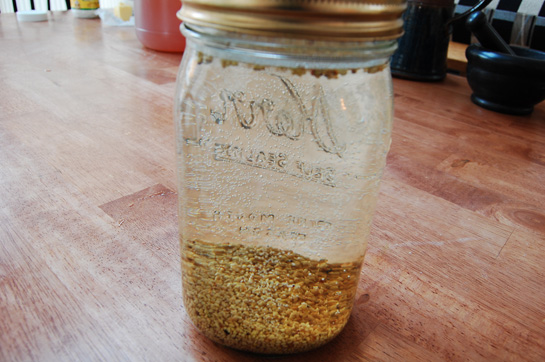
Day Two: Starting to see sprouts
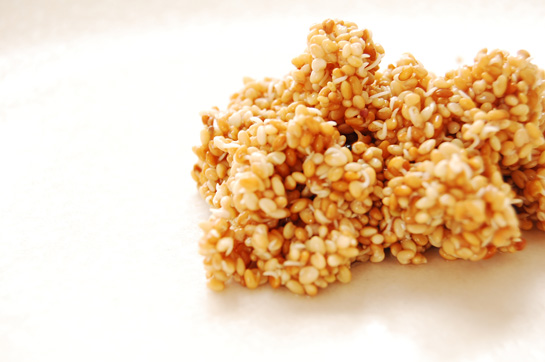
Day Three: Sprouts with long shoots
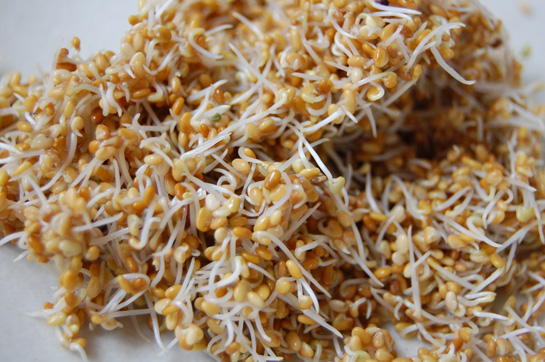 Day Four: Sprouts with the start of leaves on the end. Place near a sunny spot so that they can turn green (which is caused by chlorophyll). If all of your seeds are done sprouting, go ahead and store at this point. I sprouted for another 12 hours so that all of them could sprout their leaves.
Day Four: Sprouts with the start of leaves on the end. Place near a sunny spot so that they can turn green (which is caused by chlorophyll). If all of your seeds are done sprouting, go ahead and store at this point. I sprouted for another 12 hours so that all of them could sprout their leaves.
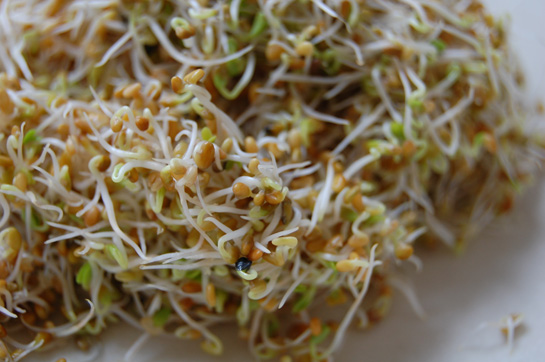
To store: Drain for 8 to 12 hours to make sure that they are dry to to the touch. Take out the screen insert and insert the normal lid piece. Place in the refrigerator. Sprout People tell us that they can last up to 6 weeks, but are, of course, better the younger they are.
Latest posts by KimiHarris (see all)
- 2 Ingredient Peppermint Bark - December 21, 2022
- Herbal Hibiscus Lemonade (Keto, THM) - March 16, 2022
- Creamy Curry Red Lentil Soup - December 8, 2021
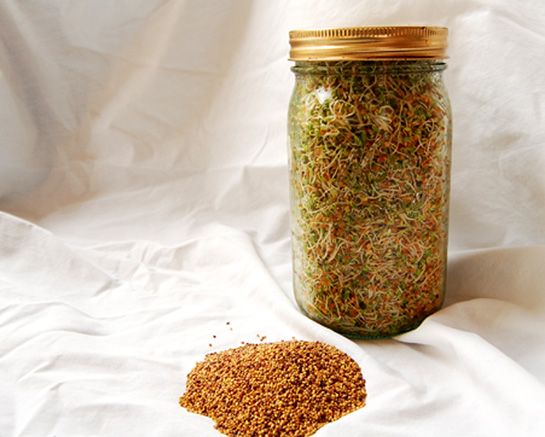
Great info, Kimi. I stopped eating alfalfa sprouts when I read that tidbit in NT, and I hadn’t replaced them with anything. It will be so amazing to eat an egg salad sandwich with avocados and CLOVER SPROUTS! Where do you get your seeds?
When I was little, my mom would sprout water cress and we would eat them on buttered bread. I can still taste it now. Almost a spicy flavor…
Do you know if water cress sprouts are nutritious? I wonder if clover seed sprouts have a similar flavor…
Alison,
That sounds delicious! Thanks for letting me know. I will have to try that. I am sure that they are nutritious since watercress is very nutritious. I bet they taste a little like radish sprouts (a bit spicy, but not as much as when full grown).
I have been reading your blog for a while, making small changes here and there, and I’m finally ready to take the plunge into sprouting. Thanks for the encouragement and for sharing your sources. I have to have things shipped, as I live in Hawaii and can’t find many of the things in stores here that I’d like to try, but with an internet source, I bet I can get them sent here! I am excited to get started! Thanks again!
this makes me want to sprout, too.
I’ve never had sprouts but I’m willing to give it a try. I prefer my veggies fairly mature. This will be a great veggie in the these long winter months here in Ohio. I did however harvest fresh spinach from my garden today and enjoyed a delicious salad.
I had no idea about the alfalfa sprouts being harmful. Yet another reason to read NT. Thanks so much for sharing the info on red clover. The pictures are great.
Shirley
I thought there were concerns with Red Clover as well – it’s a good source of phytoestrogens. I’ve been avoiding them just to be on the safe side since with my PCOS I don’t need more estrogen.
Thanks for the tip about Mountain Rose Herbs as a source. I’ve been wanting to try sprouting again (did it back in the 70s), but hadn’t found seeds yet. Of course, the only place I tried was Whole Foods. I’ll check the local HFS, and if I strike out there, I know where to go.
Hi Betsty,
Make sure to read my update before you do!
Pampered Mom,
Interesting! I’d never heard of that before. Thanks for sharing. 🙂
Kathy,
I know! I was bummed for sure. I really like clover sprouts. I haven’t tried mustard seeds before! Let me know if you have success. 🙂
I found this article when researching cavananine in sprouts. It basically states there’s not enough cavananine in sprouts to be concerned about.
http://www.living-foods.com/articles/sproutmyths.html
Bummer on the clover sprouts update! I have a whole bag I just got from Azure to try!
I have been trying mustard seeds lately and so far I am 0 for 2. Have you tried mustard sprouting? They get really mucila-whatever…sticky and they are pretty difficult to rinse. I’m not sure if that is the problem, or if my kitchen is just too cold and they get old before they can sprout. I am in the middle of trying it again and I have set them on top of the refrigerator this time to see if a little warmer area will help. Just thought I would see if you have any experience to share.
I’ve done mustard and radish seeds. Both sprouts are lovely!
Once a week I make lentils and sprouted quinoa. Quinoa is also easy to sprout. I just make the lentils in my crock pot and add the sprouted quinoa about 15 minutes before serving so that they are still raw. Let me know if you are interested in the recipe!
I just made a caprese salad with sprouts in place of basil and put hot sauce in the vinaigrette! It tasted SUPER!
I think it must have been the cold kitchen because they are growing well now on top of the fridge. I haven’t tried them, yet since they are still pretty little.
I get such a kick out of all the little science experiments I have going on all over the kitchen (milk kefir, water kefir, sprouted seeds/grains, soaked granola…). My kids won’t have to look too far when the time comes for them to enter a science fair!
Kathy, that is too funny! My kitchen looks the same – right now I have vinegar, whey, kefir and normally have yogurt & buttermilk or bread cough soaking overnight (plus the veggie starts right now!) I can hardly find an inch to cook with.
I’m getting some sprouting seeds right now – thanks for the post Kimi!
Hello! I am new to this blog, but I love it! I spend a lot of time reading all the old posts and new ones! I think it is so encouraging to have a community of people who are like minded, because lets face it, this food thing can be hard sometimes. So great job Kimi! Anyway on to my question. I have a friend who just introduced me to sprouting, I am really excited about it. Just that I could be growing fresh, living food, all year round, with little effort. Well I re-read what Sally Fallon says about it, and although she does not mention Clover, I see your point. So if Alfalfa and Clover are out, what are some good green leafy sprouts that I can safely incorporate into my diet. Also do you eat sprouts everyday, or just a few times a week. I was thinking that I could throw some into my green smoothies every once in a while.
Thanks
Katie
Hi Kimi, I’m wondering about the canavanine issue. Have you run across any information about cooking the sprouts before eating them? I wonder whether that resolves the canavanine issue at all. In an article on sprouting that I found in the NT archives, Sally pointed out that of course, traditional peoples cooked their sprouted grains before eating them. She didn’t clearly state that all sprouts should be cooked, though, so I’m wondering whether that is just for grain and legume sprouts, or for vegetable sprouts as well (she seemed hesitant about endorsing broccoli sprouts for instance). (I guess alfalfa is a kind of grass?) I haven’t turned up anything on this as most pro-sprouting information out there is from raw vegan sources so they wouldn’t have considered these issues, I think.
Thanks, Jeanmarie
I have just started sprouting and so far have just tried broccoli sprouts, which were very successful and I liked. I have been trying to decide what to sprout next. I had heard that alfalfa sprouts weren’t a good idea, so like the writer of this article I thought of red clover sprouts, but now won’t be trying those either! In fact, whilst researching this, I came across an interesting article at http://www.annieappleseedproject.org/sprouts.html which I thought you may like to read. It is in no way connected with me, so I don’t know how accurate it is, but just something I came across.
Some places say you should cook the sprouts, which I can understand for legume sprouts, but vegetable sprouts I would have thought that cooking would destroy all the valuable enzymes and decrease the nutritional value?
Does this article suggest that canavanine levels in red clover are but a fraction of what is found in alfalfa? : http://pubs.acs.org/doi/abs/10.1021/jf00063a023
The discussion of canavanine toxicity just goes to show you that it’s not healthy to eat the same food all the time or to prepare food the same way all the time. All things in moderation.
The fact that canavanine triggers mutations and damages an organism’s ability to make protein may even be good thing, if you are trying to kill more fast-growing cells than slow-growing ones (as in sanitization or cancer chemotherapy). Just for comparison, compare cinnamon bark oil and L-canavanine. (Oral rat LD50 means how much of their body weight a group of adult rats can eat before half of them are killed by it.)
L-canavanine: greater than 4.1g/kg
(If you weigh 100lbs, eating 30lbs of strong alfalfa would, more likely than not, kill you)
Ceylon cinnamon bark oil: 3.4g/kg
(If you weigh 100lbs, eating 5 and a half ounces of the oil would, more likely than not, kill you)
Of course, you won’t eat anywhere /near/ these amounts if you’re being sensible and avoid the Miracle Insta-Cure diets that advise you to eat only (insert type of food here).
I had a 50# bag of clover that we’d used for revgetation of a recently restored pasture. We still had about half left, so I’m giving the sprouts a try. I believe they were about $2/lb at the feed store in Lampassas.
You can also usually find various sprout seeds at your local mom & pop health food store. I think the ones I get are by “NOW Healthy Foods”. Also at http://www.nowfoods.com
I like the spicy blend…crimson clover, fungareek and radish. 5.99 for a 1 lb bag. YUM!
You can also usually find various sprout seeds at your local mom & pop health food store. I think the ones I get are by “NOW Healthy Foods”. Also at http://www.nowfoods.com
I like the spicy blend…crimson clover, fungareek and radish. 5.99 for a 1 lb bag. YUM!
I put about 1/4 cup in a gallon sprouting jar, rinse several times daily and in 4/5 days have about 3 quarts of sprouts. Great in salads, in a pile with a bit of mayonnaise, salt & pepper, and scrumptious on a sandwich in place of lettuce.
Thanks everyone for the input. Chris, that was an informative article, and yes, I’ll continue to eat some sprouts here and there.
Was looking around for some info on the toxicity of red clover sprouts and came across this.
http://www.ehow.com/facts_6139473_red-clover-toxicity.html
Although I would be cautious about alfalfa sprouts, the mature plant itself is fine.
This article says that the canavanine in the R.C. sprouts is at a *detectable* level. Im not sure what level that is, but it doesn’t appear to be of much concern, as they say in the next paragraph that the canavnine in alfalfa in *high doeses* imitates lupus. It makes me wonder if its one of those 50-times-the-normal-amount-given-to-rats type studies that they are saying the R.C. sprouts are “bad” for you. I will continue to use the sprouts until I have some hard facts and numbers to prove otherwise. I think their isoflavanoid benefits tip the scales in their favor for me, at least until I know what *detectable* levels really means.
ditto on the researching of canavanine- the toxic amino acid.
Everything I read said that the more mature the sprouts were, the less the presence of canavanine. Especially allowing them to mature beyond 3 days to more like 5-7 days. Then the rinsing allows the canavanine that is eliminated from the seed to decrease in it’s concentration.
Jamie I totally agree with what your stand is here!
Where do you get the clover seeds?
Meant to leave this website as a reference:
http://www.newfrontier.com/asheville/sprouts.htm
I read in a book…
[ah ha! I found it!……. http://books.google.com.au/books?id=1Xt2rwTPmHYC&pg=PA49&dq=canavanine+sprouting&hl=en&sa=X&ei=gQ1rT7vAGuaKmQXY7IGzBg&redir_esc=y#v=onepage&q=canavanine%20sprouting&f=false ]
…that the canavanine content in alfalfa is not a problem because you would have to eat heaps and heaps of alfalfa to get the effect.
Phytoestrogens, from my understanding, are typically weak estrogens that bind with receptors to block bad xenoestrogens. I likely have/had estrogen dominance (from years on the SAD and eating lots of junk food–until recently). My hormone issues have balanced out since eating more raw plant foods. I plan to consume some clover sprouts and am now living on plant foods. I’m placing an order for sprouting seeds tonight. We try things and then make adjustments as needed.
For many centuries red clover has been a part of the eastern diet. Research shows that the essential elements of Red Clover are missing from the western diet article explains more Health Benefits of Red Clover I’m afraid it is back to basic just as nature intended.
Don’t stop wafting red clover or alfalfa sprouts just yet! Google “red clover sprouts and canavinine” and read the third one down about the myths and reality. I’m starting my first batch of red clover sprouts today!
Don’t stop eatting red clover or alfalfa sprouts just yet! Google “red clover sprouts and canavinine” and read the third one down about the myths and reality. I’m starting my first batch of red clover sprouts today!
This did concern me because coincedentally I just bought some alfalfa sprouts at the co-op but I did a little digging and what this guy says about this does make sense.If we look,we will find harmful elements in everything, even in lentils, tomatoes,potatoes, yucca etc but keep in mind that the studies that were provided were done were on mice. They were also in amounts that would be impossible for us to eat so all in all Im pretty sure either alfalfa and/or clover sprouts are not only safe but beneficial for humans .(:
http://renegadehealth.com/…/24/are-alfalpha-sprouts-toxic
You might be interested in this article about sprouts by Warren Perry. He is a science investigator.
http://www.living-foods.com/articles/sproutmyths.html
For those of you who still have any doubts about whether or not it is good to consume red clover sprouts, I highly recommend you get the book called Sprout Garden, Revised Edition by Mark M. Braunstein. It is really quite eye opening!
Pages 59-62 discuss alfalfa and red clover sprouts, and how the research and testing was done. As usual it was not anything that could produce accurate results!
His conclusion is that if alfalfa and red clover sprouts are properly sprouted and are part of a varied and healthy diet, they are fine to eat. Of course, the book explains what that means. 🙂
Anyway, I’ve come to the conclusion that they are perfectly safe to eat, and so my family and I are enjoying them!!!
Incidentally, some of the testing was done on monkeys. The Dr. in charge of this test said, “You’d have to eat a wheelbarrow full of alfalfa sprouts to get the dosage we fed the monkeys.” [page 62 of the above mentioned book]
I hope this helps. 🙂
Blessings to you!!!
Lori